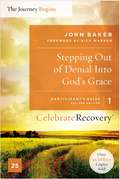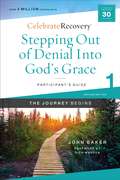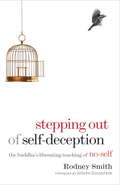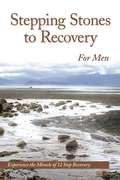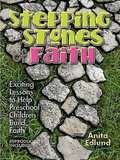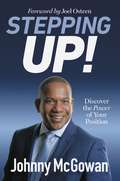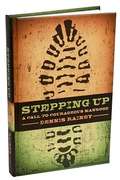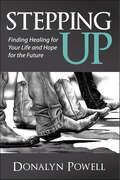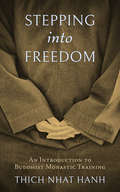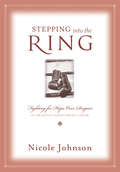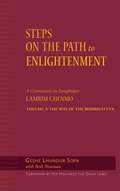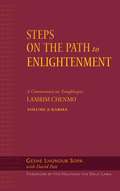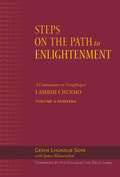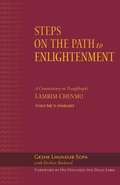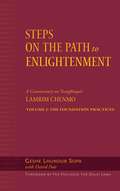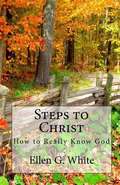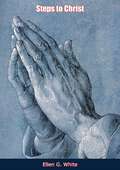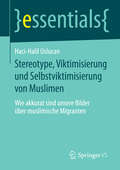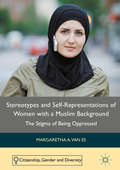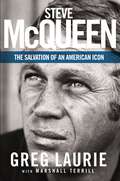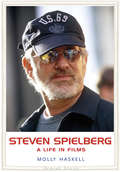- Table View
- List View
Stepping Out of Denial into God's Grace Participant's Guide 1: A Recovery Program Based on Eight Principles from the Beatitudes
by John BakerThe Celebrate Recovery Participant’s Guides are essential tools for the personal recovery journey. In the six lessons in Guide 1: Stepping Out of Denial Into God's Grace, you will experience the first 3 of the 8 recovery principles: 1 Realize I'm not God. I admit that I am powerless to control my tendency to do the wrong thing and that my life is unmanageable. "Happy are those who know they are spiritually poor" (Matthew 5:3). 2 Earnestly believe that God exists, that I matter to him, and that he has the power to help me recover. "Happy are those who mourn, for they shall be comforted" (Matthew 5:4). 3 Conciously choose to commit all my life and will to Christ's care and control. "Happy are the meek" (Matthew 5:5). By working through the lessons and exercises found in each of the four Participant’s Guides you will begin to experience the true peace and serenity you have been seeking, restore and develop stronger relationships with others and with God, and find freedom from life's hurts, hang-ups, and habits. All the scriptures have been updated to the new NIV 2011 version.
Stepping Out of Denial into God's Grace Participant's Guide 1: A Recovery Program Based on Eight Principles from the Beatitudes (Celebrate Recovery)
by John BakerThe Celebrate Recovery Participant's Guides are essential tools for the personal recovery journey. In the six lessons in Guide 1: Stepping Out of Denial Into God's Grace, you will experience the first 3 of the 8 recovery principles:1 Realize I'm not God. I admit that I am powerless to control my tendency to do the wrong thing and that my life is unmanageable. "Happy are those who know they are spiritually poor" (Matthew 5:3).2 Earnestly believe that God exists, that I matter to him, and that he has the power to help me recover. "Happy are those who mourn, for they shall be comforted" (Matthew 5:4).3 Consciously choose to commit all my life and will to Christ's care and control. "Happy are the meek" (Matthew 5:5).By working through the lessons and exercises found in each of the four Participant's Guides you will begin to experience the true peace and serenity you have been seeking, restore and develop stronger relationships with others and with God, and find freedom from life's hurts, hang-ups, and habits. All the scriptures have been updated to the new NIV 2011 version.
Stepping Out of Self-Deception: The Buddha's Liberating Teaching of No-Self
by Joseph Goldstein Rodney SmithAnatta is the Buddhist teaching on the nonexistence of a permanent, independent self. It's a notoriously puzzling and elusive concept, usually leading to such questions as, "If I don't have a self, who's reading this sentence?" It's not that there's no self there, says Rodney Smith. It's just that the self that is reading this sentence is a configuration of elements that at one time did not exist and which at some point in the future will disperse. Even in its present existence, it's more a temporary arrangement of components rather than something solid. Anatta is a truth the Buddha considered to be absolutely essential to his teaching. Smith shows that understanding this truth can change the way you relate to the world, and that the perspective of selflessness is critically important for anyone involved in spiritual practice. Seeing it can be the key to getting past the idea that spirituality has something to do with self-improvement, and to accessing the joy of deep insight into reality.
Stepping Stones To Recovery For Men: Experience The Miracle Of 12 Step Recovery
by AnonymousThis male perspective on the Twelve Step program offers insight into the unique needs of men through articles, reflections, and affirmations.This male perspective on the Twelve Step program offers insight into the unique needs of men through articles, reflections, and affirmations. It presents workable examples and ideas for positive personal and spiritual growth.
Stepping Stones of Faith: Exciting Lessons to Help Preschool Children Build Faith
by Anita EdlundThis Collection of preschool lessons examines twelve stepping stones of faith for preschoolers and develops them into complete lessons, including a Bible story for each stepping stone, activities, snacks, and music.
Stepping Up!: Discover the Power of Your Position
by Joel Osteen Johnny McGowanUnlock God's power to elevate your position and reach your full potential with Stepping Up! by Lakewood Church pastor Johnny McGowan.No matter your current position, God will unlock the power for you to reach your incredible potential. The key is to approach all you do with a servant's heart versus your own ambition. This guide to serving with passion, integrity, and intuition for success explores how to appreciate today while anticipating the possibilities that await tomorrow.With biblical wisdom and personal insights, Johnny McGowan reveals his own exciting trajectory and the doors that were opened each time he stepped up to serve God. For the past thirty years, he has devoted his gifts to serving Lakewood, one of America's largest churches. Along the way, he has marveled at the leadership opportunities God presented as he stayed committed to serving something larger than himself. By seeking only to fulfill God's will for his life, Johnny has been blessed with increasing responsibility and innumerable ways to make a difference through Stepping Up! Regardless of where you are, God can take you where you want to go-and beyond! Chasing the "number one" role or promotion by your own hands will never be fulfilling. God has even bigger things in store for you, and your future starts now. Learn to listen to God's call and let Him direct your actions. As you do, you'll rise by discovering the true power of your position.
Stepping Up: A Call to Courageous Manhood
by Dennis RaineyAs men, all of us face decisions in life that demand courage. Big or little, complex or straightforward, these choices--let's call them battles--matter a great deal. One courageous choice leads to another; tomorrow's integrity depends on today's bravery.
Stepping Up: Finding Healing for Your Life and Hope for the Future
by Donalyn PowellMost cries of pain from teenagers are silent, and too often we only discover the true depth of their pain after suicide or other self-destructive behavior. In Stepping Up, teens speak openly about their struggles with suicide, depression, sex, drug addiction, pregnancy, abuse, bullying, and self-destructive behavior through their personal letters to author Donalyn Powell, a long-time youth and suicide-prevention advocate. To each letter, Powell offers personal and practical hope: even in the darkest situations, the pain will not last, and we are never alone. God has a purpose for each of us that we alone can fulfill, and it is God’s life in us that provides our reason for living, healing for our lives, and hope for the future.
Stepping into Freedom: An Introduction to Buddhist Monastic Training
by Thich Nhat HanhHere are practice poems, novice precepts, and "Mindful Manners" on how to be a Buddhist monk and nun in the Plum Village tradition. With inspiration for every step in the monastic timetable from "Waking Up" and "Taking the First Steps of the Day" to "Lighting a Candle" in the evening, this book was originally compiled for novices who are still learning how to practice mindfulness in daily life. Thus it is perfect for beginners in mindfulness who wish to make progress in their practice at home, for young people considering a life in a spiritual community, and especially for followers of Thich Nhat Hanh who wish to deepen their understanding of the monastic way of life today.
Stepping into the Ring
by Nicole JohnsonStepping in the Ring is the 2002 Women of Faith drama sketch by Nicole Johnson, possibly her most powerful piece of writing to date. "Women have always had a unique fellowship of suffering," Nicole says. Where is the woman old or young who will not shed a tear and silently scream in her heart as she walks in these pages through the diagnosis of breast cancer and the devastation that ensues? While she focuses on the specific soul-chilling crisis, Nicole offers her readers broader insights for dealing with major losses of all kinds. She extends genuine hope and much-needed rays of light to those who are mired in hopelessness and despair. A "must" read for breast cancer patients and their loved ones. This second book in the Faith/Hope/Love Trilogy by Nicole follows the format of Dropping Your Rockwith the poignant and artistic black and white photos.
Stepping on Cheerios: Finding God in the Chaos and Clutter of Life
by Betsy Singleton SnyderBeing a mother isn’t easy. Sometimes it’s hard to experience a personalconnection with God and community when you are caught up in the chaos ofjust "doing family". Independent and self-sufficient, authorBetsy Singleton Snyder lived a full and busy life as a pastor,missionary, and wife to a husband who served in the U.S. House of Representatives. She had her first childat age 44, then at 47, she found out she was carrying triplets.Suddenly finding herself overwhelmed is an understatement.Stepping on Cheeriosis a collection of funny, warm, and charming tales from the frontlinesof parenthood, written for women who are juggling to accomplish everydayfeats of work, motherhood, marriage, church, and more. It’s a comicalstory of one woman’s realization that her crazy life is a gift and howshe found the grace in it.
Steps
by AriiahSTEPS by Ariiah is a poetic diary documenting how one Soul entered, by agreement, a body living on Earth. One took her leave and one took her welcome. When the host body lost its etheric particles and acquired new ones, a journey of Transformation began when the higher Soul was installed into the body. The author used poetry to cope with the tremendous Spiritual/physical/emotional and psychological challenges of the Process, while retaining the former host's memories. Poems became paper friends; hands to hold onto in the silence, giving comfort to the solitary passage. Everyone and everything grows Spiritually by taking Steps of Enlightenment. These poems were like handrails accompanying some of the steps. One of the steps was becoming a Group Soul. These steps were recorded without the thought of writing a book, but this little book, a Soul's personal journey into a new life in a different body and on Earth, became what it was meant to become. A poetic peek into an ascension at the Soul level. A completion of a promise written long ago, in Love. Enlightenment is not something that happens with one step. It is a process. A good metaphor is a staircase. Steps of Enlightenment open up everything and everyone. No two paths could ever be the same. But they do lead in the same direction. Everyone and everything goes back into the same Eternal Prime energy; a Love that cannot be described. I did an impossible thing. I changed staircases and became a totally different person. Wistancia took her leave and Ariiah took her welcome. My Soul was brought into this host body and placed on different Steps. It could never be easy to change Souls in the same body. This is the story of my journey. But it is more than that. We are all on a journey and we are all taking big steps now and they are going in the same direction. Today I am more gently slipping into my new garment of life. But even that is just another step.
Steps Along the Path
by Ajahn Tate Thanissaro BhikkhuA short handbook on the practice of meditation with tips and recommendations for new and experienced meditators, with a discussion of how best to respond when visions and signs arise.
Steps into the Blessed Life
by Frederick Brotherton MeyerTHERE is a Christian life, which, in comparison with that experienced by the majority of Christians, is as summer to winter, or, as the mature fruitfulness of a golden autumn to the struggling promise of a cold and late spring. It is such a life as Caleb might have lived in Hebron, the city of Fellowship; or the Apostle John was living, when he wrote his epistles. It may be fitly termed the Blessed Life.And the Blessedness of the Blessed Life lies in this: that we trust the Lord to do in us and for us what we could not do; and we find that He does not belie His word, but that, according to our faith, so it is done to us. The weary spirit, which has vainly sought to realize its ideal by its own strivings and efforts, now gives itself over to the strong and tender hands of the Lord Jesus; and He accepts the task; and at once begins to work in it to will and to do of His own good pleasure, delivering it from the tyranny of besetting sin, and fulfilling in it His own perfect ideal.This Blessed Life should be the normal life of every Christian; in work and rest; in the building-up of the inner life, and in the working-out of the life-plan. It is God’s thought not for a few, but for all His children. The youngest and weakest may lay claim to it, equally with the strongest and oldest. We should step into it at the moment of conversion; without wandering with blistered feet, for forty years in the desert; or lying, for thirty-eight years, with disappointed hopes, in the porch of the House of Mercy.But since many have long ago passed the moment of conversion, without entering the Blessed Life, it may be well to show clearly, what the first step must be, to take us within its golden circle. Better take it late than never.
Steps on the Path to Enlightenment
by His Holiness the Dalai Lama Beth Newman Geshe Lhundub Sopa David PattSteps on the Path to Englightenment: The Foundation Practices marks the first volume of a much-anticipated, comprehensive commentary on the Lamrim Chenmo by the renowned Buddhist scholar, Geshe Sopa. This landmark commentary on what is perhaps the most elegant Tibetan presentation of the Buddhist path offers a detailed overview of Buddhist philosophy, especially invaluable to those wanting to enact the wisdom of the Buddha in their lives. In the Lamrim Chenmo, Tsongkhapa explains the path in terms of the three levels of practitioners: those of small capacity who seek happiness in future lives, those of medium capacity who seek liberation from the cycle of suffering, and those of great capacity who seek full enlightenment in order to benefit all beings. This volume covers the topics common to the first level: Tsongkhapa's explanations of the role of the teacher, his exhortation to take the essence of human existence, the contemplation of death and future lives, and going for the refuge. Given his vast knowledge and his experience in both Tibetan and Western contexts, Geshe Sopa is the ideal commentator of this work for the modern student of Tibetan Buddhism.
Steps on the Path to Enlightenment
by His Holiness the Dalai Lama Geshe Lhundub Sopa David PattThis second volume of the five-volume commentary by the renowned Buddhist scholar Geshe Lhundub Sopa focuses on the key Buddhist concepts of karma, or cause and effect, and dependent origination. Considered one of the finest living Buddhist scholars, Geshe Sopa provides commentaries essential for anyone interested in a sound understanding of Tibetan Buddhist practice and philosophy. Never has a book gone into such clear detail on karma and dependent origination--concepts which, despite many references in contemporary culture, are too often misunderstood. Here, Geshe Sopa starts from the beginning with a faithful reading of the Lamrim Chenmo and, in the end, leaves readers with the proper tools for incorporating core Buddhist concepts into their study, teaching, and practice.
Steps on the Path to Enlightenment
by Geshe Lhundub Sopa James BlumenthalAn exploration of the practice of samatha, the style of meditation devoted to focus and attentionGeshe Sopa continues his elucidation of Lama Tsongkhapa's masterwork on the Buddhist path with an explanation of the core meditative practice of samatha, or calm abiding. Showing how it is absolutely essential for--and goes hand in hand with--the achievement of insight into reality, he gives practical tips for countering sleepiness, agitation, and their more subtle counterparts. Leading us step by step toward deeper levels of concentration, volume 4 of the Steps on the Path to Enlightenment series brings readers closer to the ultimate goal of samatha: unlimited and effortless focus.
Steps on the Path to Enlightenment: Insight
by Geshe Lhundub Sopa Dechen RochardThe final installment of the Steps on the Path to Enlightenment series examines the nature of reality with a master class in Buddhist Middle Way philosophy and meditation. The late Geshe Sopa was a refugee monk from Tibet sent to the United States by the Dalai Lama in 1963. He became a professor at the University of Wisconsin, training a generation of Western Buddhist scholars, and was a towering figure in the transmission of the Buddhism to the West. In this fifth and final volume of his commentary on Lama Tsongkhapa’s masterwork on the graduated steps of the Buddhist path, Geshe Sopa explains the practice of superior insight, or wisdom, the pinnacle of the bodhisattva's perfections. All the Buddhist practices are for the purpose of developing wisdom, for it is wisdom that liberates from the cycle of suffering. All other positive actions, from morality to deep states of meditation, have no power to liberate unless they are accompanied by insight into the nature of reality. With unparalled precision, Geshe Sopa unpacks this central principle with scholarly virtuosity, guiding the reader through the progressive stages of realization.
Steps on the Path to Enlightenment: The Foundation Practices
by His Holiness the Dalai Lama Beth Newman Geshe Lhundub Sopa David PattSteps on the Path to Englightenment: The Foundation Practices marks the first volume of a much-anticipated, comprehensive commentary on the Lamrim Chenmo by the renowned Buddhist scholar, Geshe Sopa. This landmark commentary on what is perhaps the most elegant Tibetan presentation of the Buddhist path offers a detailed overview of Buddhist philosophy, especially invaluable to those wanting to enact the wisdom of the Buddha in their lives. In the Lamrim Chenmo, Tsongkhapa explains the path in terms of the three levels of practitioners: those of small capacity who seek happiness in future lives, those of medium capacity who seek liberation from the cycle of suffering, and those of great capacity who seek full enlightenment in order to benefit all beings. This volume covers the topics common to the first level: Tsongkhapa's explanations of the role of the teacher, his exhortation to take the essence of human existence, the contemplation of death and future lives, and going for the refuge. Given his vast knowledge and his experience in both Tibetan and Western contexts, Geshe Sopa is the ideal commentator of this work for the modern student of Tibetan Buddhism.
Steps to Christ
by Ellen G. WhiteSteps to Christ has helped thousands become acquainted with Jesus. And it has helped many more, including those who have walked with Him for years, to know Him better. In just thirteen short chapters, you discover the steps to finding a forever friendship with Jesus. You read about His love for you, repentance, faith and acceptance, growing like Him, the privilege of prayer, what to do with doubt, and how to spend your days rejoicing in your best Friend, Jesus.
Steps to Christ: : (learn How To Pray, The New Born, Get Closer To God, Understand The Gospel). (Christian Home Library #Vol. 1)
by Ellen G. White"Steps to Christ" by Ellen G. White is a timeless spiritual classic that has guided millions of readers on their journey towards a deeper relationship with Jesus Christ. Written by one of the most influential authors in Christian literature, this book offers practical and profound insights into the essentials of Christian faith and the transformative power of a personal relationship with God.In "Steps to Christ," White outlines the fundamental steps one must take to experience a fulfilling and meaningful Christian life. The book is divided into concise, approachable chapters, each addressing a key aspect of spiritual growth. Topics include God's love for humanity, the need for repentance, the role of faith and trust, and the importance of prayer and Bible study.White's clear and compassionate writing makes complex theological concepts accessible, encouraging readers to reflect on their spiritual condition and take actionable steps towards personal renewal. Her emphasis on God's grace and forgiveness provides hope and reassurance to those struggling with feelings of unworthiness or doubt."Steps to Christ" is more than just a guide to personal piety; it is a call to a deeper, more intimate walk with Jesus. White's heartfelt messages resonate with readers of all ages and backgrounds, offering timeless wisdom that transcends denominational boundaries. The book is filled with practical advice and spiritual encouragement, making it an ideal resource for both new believers and those seeking to renew their faith.Ellen G. White's "Steps to Christ" remains a powerful tool for evangelism and personal devotion. Its enduring appeal lies in its ability to speak to the heart, offering a path to spiritual transformation that is rooted in the love and teachings of Jesus Christ. Whether read individually or studied in a group, this book continues to inspire and guide countless individuals on their spiritual journey.
Stereotype, Viktimisierung und Selbstviktimisierung von Muslimen: Wie akkurat sind unsere Bilder über muslimische Migranten (essentials)
by Haci-Halil UslucanDer Diskurs über Zuwanderer in Deutschland ist häufig verzerrt; Selbst- und Fremdwahrnehmungen klaffen hier meistens weit auseinander. So, wie sie gesehen werden, sehen sie sich selbst nicht; und die einheimische Bevölkerung sieht vieles nicht, was den Zuwanderern wiederum für ihr Selbstbild essenziell ist. Deutlicher wird diese Diskrepanz, wenn es sich dabei um muslimische Zuwanderer handelt. Das bleibt nicht ohne Folgen für ihre gesellschaftliche Integration und ihre Teilhabechancen. Der Beitrag analysiert zum einen, was die Quellen der verzerrten Bilder sind, stellt dann die Frage etwas allgemeiner und arbeitet die psychologischen Mechanismen der Vorurteilsgenese, der Funktion und Folgen von sozialer Diskriminierungen und Vorurteilen heraus. Abschließend wird darauf eingegangen, welche politischen und pädagogischen Maßnahmen sinnvoll sind, diese Diskriminierungen abzubauen und welche Aufgaben hier jeweils sowohl den Institutionen als auch den beteiligten Gruppen zukommen.
Stereotypes and Self-Representations of Women with a Muslim Background: The Stigma of Being Oppressed (Citizenship, Gender and Diversity)
by Margaretha A. van EsThis book explores how stereotypes of “oppressed Muslim women” feed into the self-representations of women with a Muslim background. The focus is on women active in, and speaking on behalf of, a wide variety of minority self-organisations in the Netherlands and Norway between 1975 and 2010. The author reveals how these women have internalised and appropriated particular stereotypes, and also developed counter-stereotypes about majority Dutch or Norwegian women. She demonstrates, above all, how they have tried time and again to change popular perceptions by providing alternative images of themselves and of Islam, paying particular attention to their attempts to gain access to media debates. Her central argument is that their efforts to undermine stereotypes can be understood as an assertion of belonging in Dutch and Norwegian society and, in the case of women committed to Islam, as a demand for their religion to be accepted. This innovative work provides a “history from below” that makes a valuable contribution to scholarly debates about citizenship as a practice of inclusion and exclusion. Providing new insights into the dynamics between stereotyping and self-representation, it will appeal to scholars of gender, religion, media, and cultural diversity.
Steve McQueen: The Salvation of an American Icon
by Greg LaurieJoin Greg Laurie as he takes a cross-country drive in his 1968 Highland Green Ford Mustang 390 GT through the canyons of Malibu, the alleys of Hollywood, the wide and open roads of the Midwest, and the streets of New York as he traces the woolly geography of actor Steve McQueen's life, relationships, career, and spiritual journey. This iconic muscle car was the vehicle McQueen drove in his most raucous and enduring film, Bullitt. In the 1960s, McQueen was, according to box office receipts, the biggest movie star of his generation and one of the coolest men to ever walk the planet. Greg Laurie was a teen at the time and an ardent fan of "The King of Cool," first mesmerized by McQueen in 1963's The Great Escape. Like millions of cinema fans, Greg developed a lifelong fascination with the actor. Now he has a chance to tell McQueen's story. McQueen was a complex, contradictory man who lived the same way he drove his motorcycles and cars: fearlessly, ruthlessly and at top speed. After a lifetime of fast cars, women, and drugs, McQueen took a surprising detour. In this book, Laurie thoughtfully interviews Steve McQueen's friends, co-stars, associates, widow, and pastor to tell of the dramatic life-change for the actor in the spring of 1979 - six months before McQueen was diagnosed with terminal cancer. What were the critical steps that led McQueen to make such a life-altering decision? Perhaps more importantly, why is that part of his story so rarely told? This book answers these questions. Greg Laurie will follow the seeds of Christianity that were sown throughout McQueen's improbable life where a Light finally shone into the darkness of his troubled life. These seeds miraculously germinated, allowing McQueen to see that redemption through Jesus Christ is a lasting truth more glittering and real than any magic of the entertainment industry.
Steven Spielberg: A Life in Films
by Molly HaskellA film-centric portrait of the extraordinarily gifted movie director whose decades-long influence on American popular culture is unprecedented “Everything about me is in my films,” Steven Spielberg has said. Taking this as a key to understanding the hugely successful moviemaker, Molly Haskell explores the full range of Spielberg’s works for the light they shine upon the man himself. Through such powerhouse hits as Close Encounters of the Third Kind, E.T., Jurassic Park, and Indiana Jones, to lesser-known masterworks like A.I. and Empire of the Sun, to the haunting Schindler’s List, Haskell shows how Spielberg’s uniquely evocative filmmaking and story-telling reveal the many ways in which his life, work, and times are entwined. Organizing chapters around specific films, the distinguished critic discusses how Spielberg’s childhood in non-Jewish suburbs, his parents’ traumatic divorce, his return to Judaism upon his son’s birth, and other events echo in his work. She offers a brilliant portrait of the extraordinary director—a fearful boy living through his imagination who grew into a man whose openness, generosity of spirit, and creativity have enchanted audiences for more than 40 years.
